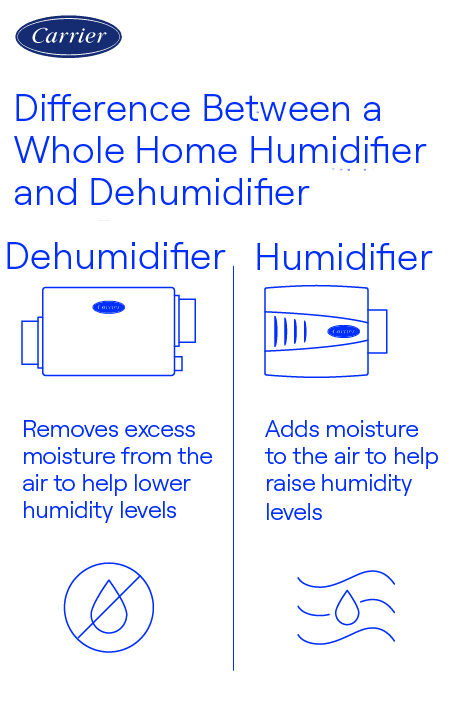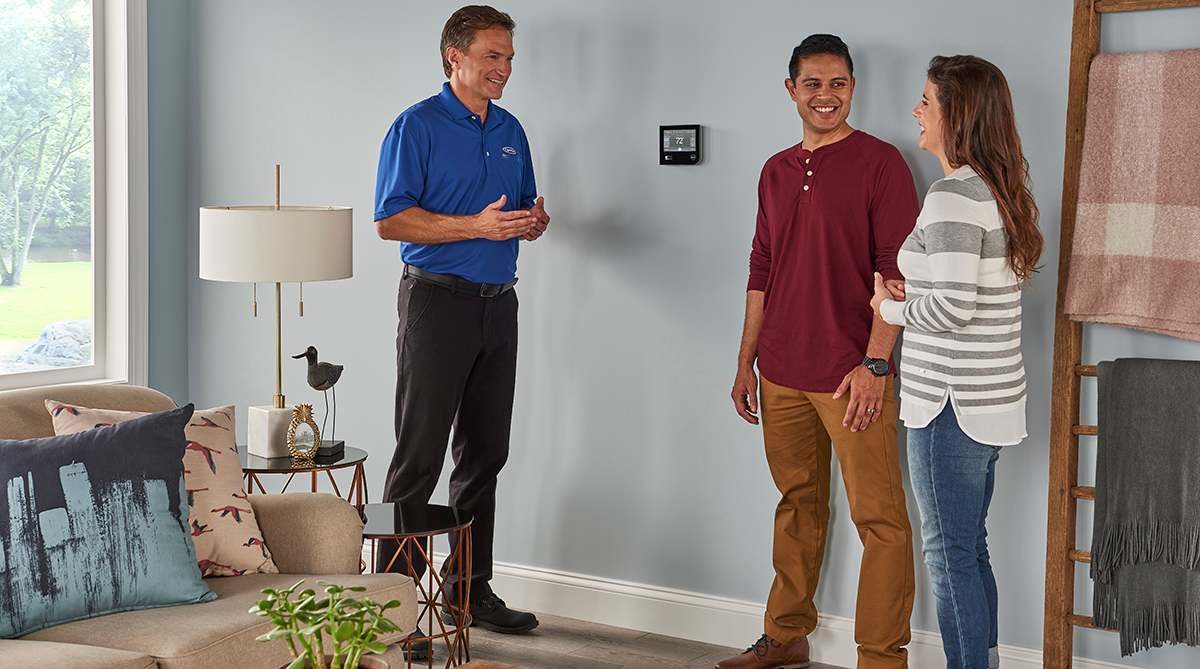The Difference Between A Humidifier vs Dehumidifier
By Travis Baugh
Maintaining a comfortable indoor environment requires understanding the difference between a humidifier and a dehumidifier. Both devices are crucial for regulating humidity levels in your home, but they serve different purposes. Let's explore the benefits of each to help you make an informed decision.

Understanding Humidity Levels
Humidity refers to the amount of moisture in the air, playing a vital role in ensuring a comfortable and healthy indoor environment.
The EPA recommends indoor relative humidity (RH) should be kept below 60 percent -- ideally between 30 percent and 50 percent. 1
High humidity can promote mold, mildew, and dust mites, triggering allergies and respiratory problems. Conversely, low humidity can lead to dry skin and irritated eyes. Both high and low humidity can also cause structural damage to your home.
Difference Between A Dehumidifier And Humidifier

- Humidifiers add moisture to the air by releasing water vapor into the air, increasing humidity levels and combating dry air caused by heating systems or dry climates. Learn more about what does a humidifier do.
- Dehumidifiers extract excess moisture from the air by drawing in humid air, cooling the air to condense and remove moisture, reheating the air, and then releasing the dry air back into the room. This reduces humidity levels. Learn more about what does a dehumidifier do.
Advantages Of A Humidifier Vs Dehumidifier
Humidifiers helps with dryness-related issues, such as dry skin, irritated nasal passages, and possibly sore throats or sinus problems by moisturizing the air. Humidifiers can also help reduce static electricity. Low humidity can cause wooden furniture and floors to dry out and crack, and boosting humidity levels with a humidifier can help prevent such damage.
A dehumidifier helps with high moisture-related issues, such as mold spore and mildew growth and musty odors. Dehumidifiers help reduce these allergens to improve indoor air quality. Excessive humidity can also cause structural issues like warped wood and peeling paint. Dehumidifiers control humidity levels, helping safeguard your property.
| Feature | Humidifier | Dehumidifier |
| Purpose | Increases humidity (adds moisture) | Reduces humidity (removes moisture) |
| Best for | Dry climates, winter months | Humid climates, summer months |
| Health Benefits | May help relieve dry skin, sinus issues, allergies, and cold symptoms | May help prevent mold spores, dust mites, and musty odors |
| Common Uses | Homes with dry air; preserving wooden furniture | High-humidity areas prone to mold and mildew |
| Types | Fan-powered, steam, evaporative, bypass | - |
| Ideal Humidity Range | 30-50% | 30-50$ |
| Energy Consumption | Moderate | Moderate |
| Offered By Carrier Dealers? | Yes | Yes |
| Effect on Temperature | Can slightly warm air | Can slightly cool air |

Choosing A Humidifier Vs Dehumidifier For Your Home
Deciding between a humidifier and dehumidifier involves evaluating your specific needs and living conditions.
- Climate: If you live in a dry climate, a humidifier can add moisture to the air, improving comfort. In humid regions, a dehumidifier can remove excess moisture, preventing mold growth.
- Home humidity level: The humidity level of your home helps determine which humidification option is right for you. When humidity levels are very low - oftentimes during winter when indoor air is typically more dry - a humidifier may be best. When humidity levels are overly high - oftentimes during summer when indoor air is typically more moist – a dehumidifier may best suit your needs.
Carrier offers a range of humidifiers and dehumidifiers designed for optimal comfort and improved air quality, helping ensure a healthier and more enjoyable living environment.
Maintaining Optimal Humidity Levels
Proper humidity control is essential for comfort, health, and home preservation. Whether using a humidifier to add moisture or a dehumidifier to reduce excess humidity, regular maintenance is key to ensuring efficiency.Tips for Proper Maintenance and Cleaning
Regularly clean and replace filters in your whole-home humidifier or dehumidifier to prevent mold buildup and ensure efficient operation. Check for clogs in drainage systems and inspect sensors to maintain proper humidity control.How to Troubleshoot Common Issues
If your whole-home humidifier isn’t producing enough moisture, check for clogged filters, low water levels, or a malfunctioning solenoid valve. For a dehumidifier that isn’t reducing humidity, inspect the air filter, ensure proper drainage, and verify that the humidity sensor is functioning correctly.Using Smart Technology for Humidity Control
Smart thermostats and humidity sensors allow automatic adjustments based on real-time humidity levels. These systems provide alerts for maintenance needs, ensuring optimal indoor air quality and energy efficiency.Consult A Carrier Dealer On Humidifier vs Dehumidifier
Maintaining the right indoor humidity level is essential for comfort, health, and protecting your home. Choosing between a humidifier and a dehumidifier can be challenging, but working with your local Carrier dealer ensures you make the best decision based on expert evaluation and professional recommendations.
A Carrier dealer can assess your home’s humidity levels using advanced tools to determine whether your indoor air is too dry or too humid. If your home suffers from dry air—causing issues like dry skin, allergies, and static electricity—a Carrier whole-home humidifier can restore proper moisture levels, improving comfort and indoor air quality. Conversely, if high humidity leads to mold growth, musty odors, and damage to furniture or walls, a Carrier whole-home dehumidifier can effectively remove excess moisture and prevent long-term issues.
Carrier dealers offer expert advice on selecting the right system for your home’s size, climate, and HVAC setup. They ensure proper installation, maximizing energy efficiency and system performance. Additionally, professional installation integrates seamlessly with your existing HVAC system, avoiding the inconvenience of standalone units.
Beyond installation, Carrier dealers provide ongoing maintenance and support, ensuring your humidifier or dehumidifier continues to function efficiently. Their expertise helps you avoid common issues, extend the lifespan of your equipment, and maintain optimal indoor comfort.
By working with a Carrier dealer, you receive personalized recommendations, professional installation, and long-term support, making it the best choice for managing your home’s humidity.


